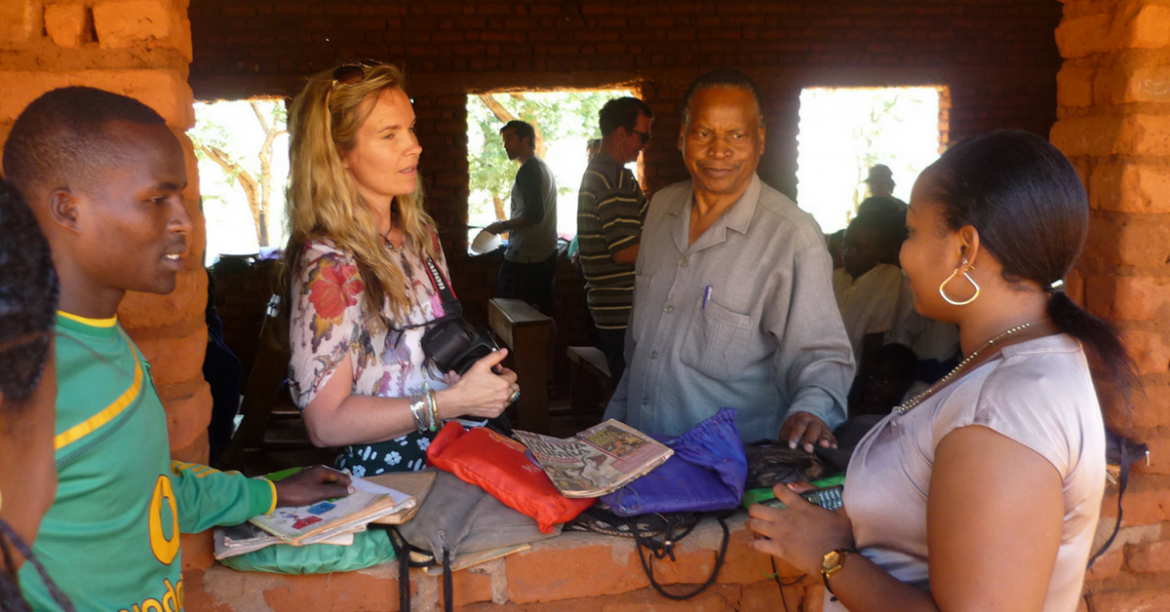Last week we had the awesome opportunity of sitting down with the beautiful, and humble, Cassandra Treadwell (or Cass as she likes to go by), from So They Can.
So They Can, founded in 2009, is a non-profit organization that works to house, educate and empower impoverished communities in Tanzania and Kenya. So far, So They Can has:
- educated around 960 children at the Aberdare Ranges Primary School.
- Provided homes for 120 orphaned children at the Miti Mingi Village.
- Educated women through the Micro Finance Business School.
- Formed an educational collaborative with 4 different schools in Tanzania.
- And provided hundreds of opportunities for children, and adults, in these communities.
We sat down with Cass to pick her brain a little, and chat about the rewarding and difficult parts of working with So They Can.
How did “So they can” get started?
“When I was 16 I worked in an orphanage in Argentina. So I had my first look at poverty at 16. Later, I worked in hospitals in the ICU department. My husband was a financial trader and we moved with work. I wanted to investigate and see how I could do more.
I backpacked through Kenya, pre-children, and fell in love with it there. Later, I watched Hotel Rwanda, and said ‘I’ve got to do something more.’
I visited the camps later on and they were horrendous. We visited rubbage dump where kids were orphaned, and I had 4 kids at the time. It really touched home with me.One in particular got my attention because they have a flat piece of land with water coming through every inch. We asked what we could do and they asked us to educate their kids.
They said, ‘Would you educate their kids. Education is the key to stopping tribal violence?’
Together we would build school, construct it, and sit on the board of management. That opened in 2010. And we open 3 schools a year.”
I read that you came to the conclusion that a lack of education during a visit to Kenya and Tanzania. How often do you physically go there?
“I go at least twice a year.”
And how does funding work with a non-profit organization like So they can?
“Most of our funding comes from Australia. There are fundraisers, sponsorship, we also have camps that sew, and make things to sell and that raises money as well.” Im constantly wanting to expand, but very conscious at I need to focus on what I’m doing.
What are some big challenges you tend to run into with running a not for profit company?
“Fundraising is always a mess of challenge. I love meeting people but I hate asking for money. I know the kids and the communities and I know I can’t let them down. We’re starting a social business and hopefully that might work. And also, trying to think of different ways to diversify the funding stream. Constantly trying to find that level of what is enough. Once you get above that level, it’s a bit dangerous.”
How does sponsoring a child through So they can work?
“You can go directly on our website to do it. The money provides extra support to the children.”
What would you say are the most rewarding parts of working with So they can?
“Personally the biggest challenge is living in two different worlds. Reminding myself that everyone has their own challenge. On a work scale, sometimes working with the Kenyan government, I get frustrated. But then I look and realize I couldn’t have built these schools without them. The distance is quite hard because it’s remote, but you’re trying to keep everyone in harmony and energized. But really the main challenge is raising the money. I’m so passionate about about how rewarding it is for me and my family to connect to these worlds. I feel like we’ve lost community, connection and emotional wealth. I take people there [to Kenya and Tanzania] and they see them living .You see these people who really embrace life and celebrate and live in the moment. They’re reminding us about what we should be grateful for and what we should be happy about. My family often focuses on what we don’t have. And they teach us to rely on compassion even though they have nothing and they’re really supported in that way. People crave that.”
Have you brought your kids to Kenya and Tanzania?
“I have. I’ve brought my oldest when she was about 12, and I think that’s important. Just a part of trying to give at as early of an age possible of what I’ve learned over there. I want everyone to know how good it is to be philanthropic. Whatever it is.
Trying to stop the social pressure of success being how much money you have is important. Give them that experiential cycle of giving to recognize ‘I’m doing for this me/I’m doing this because it makes me feel guilty. ‘ Connecting the two worlds.”
How do you ease peoples mind when you take them to these impoverished communities?
“If people are suffering you will suffer. Show them a solution. Show the problem, but give the solution. It’s empowering. One of my goals is to bring bring that community and compassion back. Charity is a two way street. We give them things but I’m bringing back what I’ve learned from these compassionate people there. Let people experience that.”
 Food
Food Farmers
Farmers Sustainable Living
Sustainable Living Living Planet
Living Planet News
News